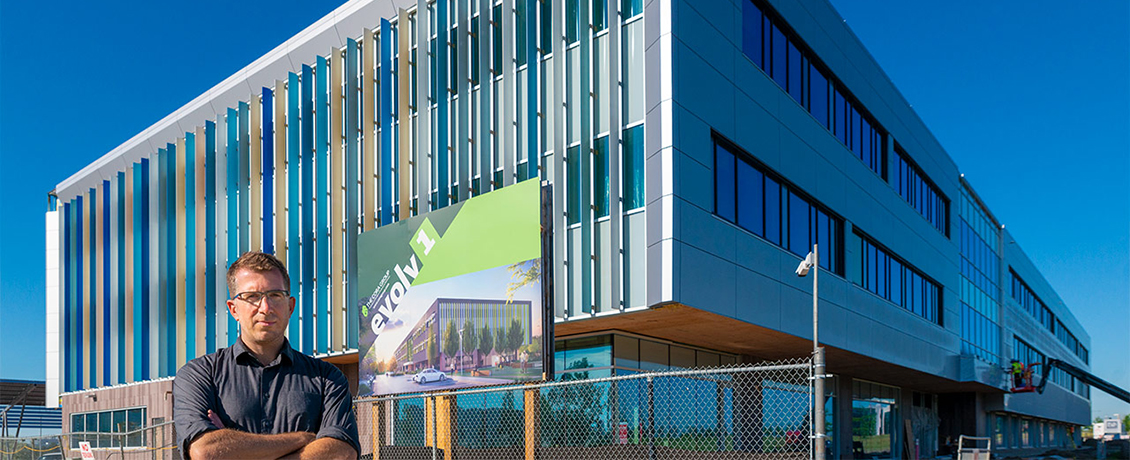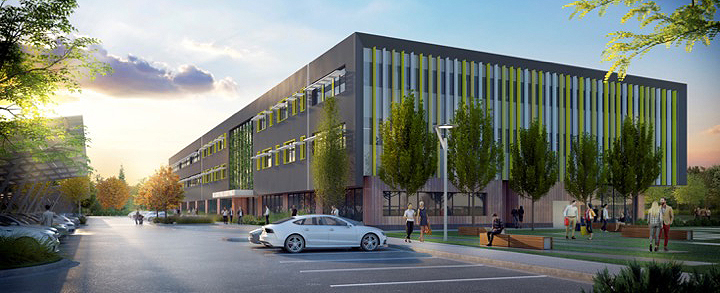
Manuel Riemer is leading the way when it comes to the psychology of sustainability.
Riemer and his research partners recently secured more than $1 million in provincial and federal grants to study human behaviour in green buildings. His research will be based in Waterloo’s evolv1 building, a LEED Platinum, net positive energy, multi-tenant office building.
The building, developed and owned by the Cora Group, will become a “living laboratory” to help understand how to best engage users of sustainable buildings in sustainable practices.
Sustainable Waterloo Region, an organization established by Laurier alumni Mike Morrice (BBA, BSc ’08) and Chris DePaul (BBA, BSc ’08), along with Lazaridis School Associate Professor Barry Colbert, originally initiated the evolv1 project and has played a critical role in making the project reality.
Riemer’s role is to help ensure the project meets its ambitious environmental goals by addressing the human side of energy use.
“Often, the people side of sustainability is what decision-makers we talk to get excited about in terms of saving energy,” Riemer says.
“But there’s a danger in green buildings that people think, ‘Oh, now I can do whatever I want’ and they needlessly use too much energy. That type of performance gap is very common and is exactly what we’re looking to address.”
Riemer’s goal is to understand how to engage the users and managers of green buildings to create a culture of sustainability. His findings will lead to programming and processes that can be applied to other commercial green buildings, including new and retrofitted buildings.

“We want to use the evolv1 building as a tool for engagement, to create learning moments around the building, but that doesn’t happen automatically,” Riemer says. “We’re hiring a director of culture and sustainability to engage people in sustainability. There has to be an investment in fostering engagement.”
Riemer’s passion for sustainability began before he joined Laurier’s Faculty of Science in 2008. While studying at Vanderbilt University in Tennessee, he was captivated by Al Gore’s 2006 climate change documentary An Inconvenient Truth and felt propelled to act.
“I watched Al Gore’s film and that had a pretty big impact on my life," Riemer says. "I feel that climate change is an issue of great urgency, that if we don’t deal with this it has so many other consequences on the things I care about like equality, poverty and well-being.”
At Vanderbilt, Riemer researched mental health and behaviour. He felt his expertise could be applied to studying human behaviour affecting the planet. Upon arriving at Laurier, Riemer's research became fully focused on engagement and sustainability.
“Talking to government officials and municipalities, I did not expect that the interest in our research would be so abundant,” Riemer says. “I think there are multiple factors coming together. People are already investing in building retrofits, but there’s more to it than just building a building.
"There’s also a pressure to meet the ambitious goals that the government has set. Governments are realizing they need to go beyond the normal.”
Riemer’s innovative approach to sustainability has received attention from across Canada. He was recently provided funding by the Government of Alberta to understand how green-certified buildings contribute to employee well-being and productivity. Riemer is also the director of the Viessmann Centre for Engagement and Research in Sustainability at Laurier and a founding partner of the social enterprise Sustainable Societies Consulting Group.
“We’re trying to shift the thinking a bit on how people approach sustainability,” Riemer says. “We don’t call it behaviour change, as that is not very engaging. We want to look at how we can work together to make a culture shift, which is a longer-term, more comprehensive approach.”